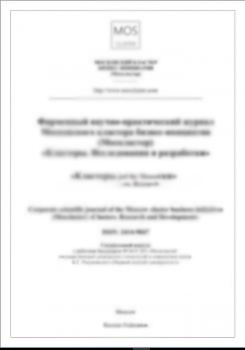Russian Federation
Russian Federation
Netherlands
Irkutsk Scientific Center SB RAS (otdel mediko-biologicheskih issledovaniy i tehnologiy, zaveduyuschiy)
Irkutsk, Irkutsk region, Russian Federation
Aim: to reveal the association of gene CYP2C19 polymorphisms and efficacy and safety endpoints of clopidogrel therapy in patients with acute coronary syndrome. Materials and methods. A total of 431 patients with acute coronary syndrome undergoing coronary stent placement was studied. CYP2C19 polymorphisms (*2, *3, *17) were evaluated, platelet aggregation with ADP and efficacy and safety for 30 days after coronary stent placement was studied. Results. Within the selected patients there was no significant association between carriage of at least one allele of the CYP2C19*2, and/or CYP2C19*3 and paradoxical response to clopidogrel. Significant association between carriage of allele CYP2C19*17 and the presence of bleeding was detected. The algorithm for selection of individual drug therapy for patients receiving clopidogrel therapy was developed. Conclusion. The results can be extremely important for decision-making about the strategy of dual antiplatelet therapy and the tactics of choice of drugs.
CYP2C19, clopidogrel, paradoxical reaction, stent thrombosis, residual platelet aggregation, dual antiplat elet t herapy
Одним из основных препаратов для двойной антитромбоцитарной терапии в кардиологии является клопидогрел, использование которого позволяет снизить частоту тромботических осложнений. Антитромбоцитарная терапия для
оптимизации результатов стентирования коронарных сосудов должна обеспечивать баланс между минимизированным риском тромбоза стентов и риском кровотечения [1].
1. Aradi D., Storey R.F., Komócsi A., Trenk D. et al. On behalf of the Working Group on Thrombosis of the European Society of Cardiology Expert. Position paper on the role of platelet function testing in patients undergoing percutaneous coronary intervention // Eur. Heart J. – 2014. – Vol. 35 (4). – P. 209–215.
2. Mega J.L., Simon T., Collet J.P., Anderson J.L. et al. Reduced-function CYP2C19 genotype and risk of adverse clinical outcomes among patients treated with clopidogrel predominantly for PCI: a meta-analysis // JAMA. – 2010. – Vol. 304 (16). – P. 1821–1830.
3. Harmsze A.M., van Werkum J.W., ten Berg J.M., Zwart B. et al. CYP2C19*2 and CYP2C9*3 alleles are associated with stent thrombosis: a case–control study // Eur. Heart J. – 2010. – Vol. 31 (24). – P. 3046.
4. Sibbing D., Stegherr J., Latz W., Koch W. et al. Cytochrome P450 2C19 loss-of-function polymorphism and stent thrombosis following percutaneous coronary intervention // Eur. Heart J. – 2009. – Vol. 30 (8). – P. 916–922.
5. Clinical and translational science: principles of human research; 1st ed. / Ed. by D. Robertson, G.H. Williams. – 2009. – 579 p. 6. Lifshic G.I., Danilkina S.T., Gus'kova E.V., Voronina E.N. Associaciya genov, kodiruyuschih belki gemostaza, s parametrami perifericheskogo gemostaza i predraspolozhennost'yu k aterotrombozam u pacientov s serdechno-sosudistymi zabolevaniyami // Kardiovaskulyarnaya terapiya i profilaktika. – 2011. – № 4. – S. 90–96.
6. Knauer N.Yu., Lifshic G.I., Voronina E.N. Informativnost' geneticheskih markerov dlya optimizacii personalizirovannoy terapii klopidogrelem // Kardiologiya – 2013. – T. 53, № 8. – S. 72–75.
7. Lifshic G.I., Aparcin K.A. Prospektivnoe mnogocentrovoe issledovanie «PROTOKOL: Personalizirovannaya teRapiya klOpidogrelem pri sTentirovanii po povodu Ostrogo Koronarnogo sindrOma s uchetom geneticheskih poLimorfizmov» // Kachestvennaya klinicheskaya praktika. – 2015. – № 1. – S. 78–86.
8. Price M.P., Murray S.S., Angiolillo D.J., Lillie E. et al. Influence of genetic polymorphisms on the effect of high- and standard-dose clopidogrel after percutaneous coronary intervention // J. Am. Col. Cardiol. – 2012. – Vol. 59 (22). – P. 1928–1937.
9. Aynetdinova D.H., Udovichenko A.E., Sulimov V.A. Rezistentnost' k antitrombocitarnym preparatam u bol'nyh ostrym koronarnym sindromom s pod'emom segmenta ST // Racional'naya farmakoterapiya v kardiologii. – 2008. – № 2. – S. 23–29.
10. Belozertseva L.A., Voronina E.N., Kokh N.V., Tsvetovskaya G.A. et al. Personalized approach of medication by indirect anticoagulants tailored to the patient – Russian context: what are the prospects? // EPMA J. – 2012. – N 3 (1). – P. 10.
11. Zelenskaya E.M., Subbotovskaya A.I., Ganyukov V.I. i dr. Issledovanie «Protoko l»:predvaritel'nye rezul'taty v ramkah proekta // Rossiyskiy kardiologicheskiy zhurnal. – 2015. – № 10 (126). – S. 75–80.
12. Barinov E., Sulaeva O., Deliy V. Reakciya trombocitov na kollagen i puriny: ot traktovki mehanizmov agregacii k prognozirovaniyu recidiva yazvennogo krovotecheniya // Vestnik problem biologii i mediciny. – 2012. – № 2 (1–92). – S. 27–29.
13. Mega J.L., Close S.L., Wiviott S.D. et al. Genetic variants in ABCB1 and CYP2C19 and cardiovascular outcomes after treatment with clopidogrel and prasugrel in the TRITON-TIMI 38 trial: a pharmacogenetic analysis // Lancet. – 2010. – № 376 (9749). – P. 1312–1319.
14. Frolova N., Shahnovich R., Kaznacheeva E., Sirotkina O. i dr. Rezistentnost' k aspirinu u bol'nyh s ostrym koronarnym sindromom. Chast' 2 // Kardiovaskulyarnaya terapiya i profilaktika. – 2011. – № 10 (2). – S. 47–52.
15. Sychev D., Zyatenkov A., Kukes V. Klinicheskaya farmakogenetika antiagregantov: vzglyad klinicheskogo farmakologa // Rossiyskiy kardiologicheskiy zhurnal. – 2007. – № 4 (66). – S. 92–100.
16. Du G., Lin Q., Wang J. A brief review on the mechanisms of aspirin resistance // Int. J. Cardiol. – 2016. – Vol. 220. – P. 21–26.
17. Le Quellec S., Bordet J.-C., Negrier C., Dargaud Y. Comparison of current platelet functional tests for the assessment of aspirin and clopidogrel response // Thromb Haemost. – 2016. – P. 16 (4).
18. Mansour K., Taher A.T., Musallam K.M., Alam S. Aspirin resistance // Adv. Hematol. – 2009. – Vol. 2009. – P. 937352.
19. Marder V.J., Aird W.C., Bennett J.S., Schulman S. et al. Hemostasis and thrombosis : basic principles and clinical practice; 6th ed. / Ed. by V.J. Marder. – Philadelphia: Wolters Kluwer/Lippincott Williams & Wilkins Health, 2013. – P. 1134–1155.
20. Nikolaeva A.A., Nikolaev K.Yu., Lifshic G.I., Popova L.V. Sosudistaya reaktivnost' pri koronarnom ateroskleroze i social'no znachimyh faktorah riska (kurenie i alkogol'). – Novosibirsk: GPNTB SO RAN, 2011. – 220 s.





